Hospitals Buying Local
Air Date: Week of August 10, 2007
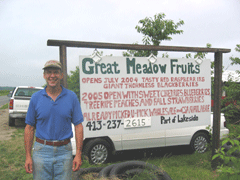
Joe Czajkowski stands in front of Great Meadows Fruit Farm in Hadley, Massachusetts. (Photo: Ashley Ahearn)
Hospitals spend 12 billion dollars a year on food, and the majority of their food is purchased from big distributors that ship food from all over the world. But there’s change afoot. Living on Earth’s Ashley Ahearn reports that hospitals are starting to buy local produce, and it’s not just the patients that benefit.
Transcript
CURWOOD: The trend toward locally grown food is moving beyond private kitchens and into some large institutions as well. The potential market is huge. For example, U.S. hospitals spend some 12 billion dollars a year on meals. And in recent years, many hospitals have been trading in their bland and basic menus in favor of distinctive cooking that draws heavily on local sources of food. This not only offers healthier, better tasting fare but also cuts down on carbon emissions from transportation. Living on Earth’s Ashley Ahearn has our story from Springfield, Massachusetts.
[FAKE BIRD DISTRESS CALLS]
AHEARN: At Great Meadows Fruit Farm in western Massachusetts you won’t find real birds, if farmer Joe Czajkowski has anything to say about it.
[FAKE BIRD DISTRESS CALLS]
CZAJKOWSKI: That’s a distress call, that’s supposed to tell the little birds that would come out to eat the blueberries, and the raspberries, and the cherries that they should get just out of here.

Joe Czajkowski stands in front of Great MeadowsFruit Farm in Hadley,Massachusetts. (Photo: Ashley Ahearn)
CZAJKOWSKI: No that’s a recorded bird.
AHEARN: Are these real fruit?
CZAJKOWSKI: This is real fruit with fake birds singing.
[LAUGHING]
AHEARN: The fruit is most definitely real. Pale pink peaches, just starting to blush with ripeness, hang from the fruit trees on Joe’s 300-acre farm.
CZAJKOWSKI: The branches really couldn’t hold any more and we’ve already thinned them twice. They’re gonna fatten up and bloom nicely in the next week.
[PICKS PEACH FROM BRANCH]
Look at how beautiful that is.
AHEARN: At Great Meadows, Joe Czajkowski grows 14 different fruits and vegetables. Over the years he’s always sold to local markets, or let people come and pick the produce themselves. But he’s got a new customer now, and business is booming.
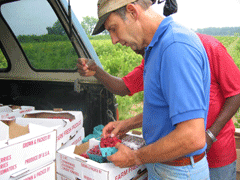
Joe Czajkowski boxing fresh raspberries.(Photo: Ashley Ahearn)
AHEARN: “They” is the Baystate Medical Center, about 20 miles down the road. It’s the biggest employer in the city of Springfield. Since Joe Czajkowski started selling fresh produce to the hospital, his sales have gone up by 20 percent.
But more than boosting his income, the steady demand for produce from Baystate has afforded Joe a new lifestyle. He can now work year round thanks to new greenhouses.
CZAJKOWSKI: I don’t want to be seasonal any longer. There’s a line in a blues song, “The world sure turns cold when you lose your cash flow.” And I really don’t want to lose my cash flow. I want to have a steady business that can provide for my family.
[HOSPITAL CAFETERIA SOUND]
AHEARN: It’s lunchtime and people in scrubs are loading their trays at a buffet counter 20 miles down the road.
CALLAHAN: My name is Dick Callahan I’m the executive chef at Baystate Medical Center. We’re in the North Cafeteria of the hospital.
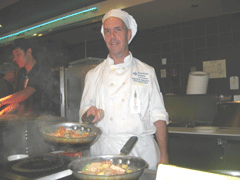
Dick Callahan, Head Chef at Baystate Medical. (Photo: Ashley Ahearn)
[SIZZLING POT SOUNDS FADE UP]
CALLAHAN: One of the areas that we focus on a lot is the sauté station. Today we’re featuring the local summer squash, zucchini, native tomatoes and fresh basil with salmon and a very light broth.
AHEARN: That sounds like the Ritz, not a hospital.
CALLAHAN: It isn’t the hospital and that’s what we want. You know, we want people walking out of here thinking that it’s something other than what they’re expecting.
AHEARN: Dick Callahan and his team serve five to six thousand meals a day. They’re using local produce, like the fruit Joe Czajkowski just dropped off, to give patients and hospital staff more healthy, fresh food options than they’ve ever had before.
CALLAHAN: One of the other things we did over here was we took the fresh blueberries and fresh raspberries and just mixed them with yogurt.
AHEARN: They look pretty familiar we actually saw where they came from a couple of minutes ago.
CALLAHAN: Oh really? Well it’s nice to be able to use a local person. I mean, years ago everything came from an agri-business, it came from one of the major conglomerates.
AHEARN: Like many hospitals, Baystate Medical Center is under contract to purchase most of its food from U.S. Foodservice, a nation-wide distributor. But in the past year, the hospital has spent close to 500,000 dollars on produce and supplies from local farms and distributors, like Great Meadows. In the process, it’s saved 10 percent.
Baystate hopes to double it’s local purchases in the next five years, and possibly change the terms of its next contract with U.S. Foodservice to buy even more.
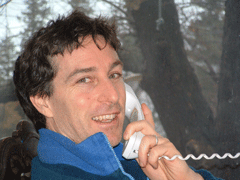
Jamie Harvey of Healthcare Without Harm.(Courtesy of Jamie Harvey)
HARVIE: What you saw at Baystate is sort of a microcosm of this incredible trend in healthcare.
AHEARN: Jamie Harvie works for Healthcare Without Harm. The non-profit is campaigning to get hospitals to pledge to purchase as much local and organic food as possible.
HARVIE: I’ve been working in the healthcare industry on the purchasing side for about 10 years. I’ve never seen as much interest in this whole local foods issue. We have over 100 hospitals that have signed our healthy food and healthcare pledge. I imagine we’re going to have hundreds more in the next year or two.
AHEARN: Big food distributors say the trend is nascent but noticeable, and are moving to prepare for it. John Cabot is the Senior Vice President of sales and marketing for U.S. Foodservice.
CABOT: I spoke with our division president and he’s recently assigned two purchasing managers just to this topic and you know, two people doesn’t seem like a lot but it’s a couple hundred thousand dollar investment.
AHEARN: At some hospitals, efforts to bring in local food are well under way. Dr. Preston Maring is an associate physician in chief at the Kaiser Permanente Medical Center in Oakland, California.
Four years ago Maring started persuading local growers to hold weekly farmers markets right on the grounds at Kaiser Permanente hospitals after he took a look at what his patients were eating and where it was coming from.
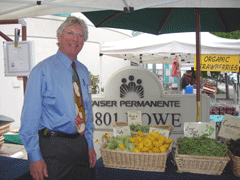
Dr. Preston Maring standing in a farmer's market. (Photo: Kaiser Permanente)
MARING: There, in the past, was basically a disconnect between our ordering patterns and what was being produced here locally. Much of the food was shipped in from all around the world.
AHEARN: Kaiser Permanente now hosts weekly farmers markets at 38 hospitals around the country and will purchase 60 tons of local produce in northern California this year.
Dr. Maring says hospitals set a standard for personal health because what doctors say to patients spreads throughout the community.
MARING: There’s nothing more important for preventative medicine or your health basically, than what you eat and so any way possible that we can get good food to people in our hospitals, it’s good for the people that eat it, if it’s sustainably farmed it’s good for the planet and it’s certainly good for the farmers.
AHEARN: For Living on Earth, I’m Ashley Ahearn in Springfield, Massachusetts.
Links
Living on Earth wants to hear from you!
Living on Earth
62 Calef Highway, Suite 212
Lee, NH 03861
Telephone: 617-287-4121
E-mail: comments@loe.org
Newsletter [Click here]
Donate to Living on Earth!
Living on Earth is an independent media program and relies entirely on contributions from listeners and institutions supporting public service. Please donate now to preserve an independent environmental voice.
NewsletterLiving on Earth offers a weekly delivery of the show's rundown to your mailbox. Sign up for our newsletter today!
 Sailors For The Sea: Be the change you want to sea.
Sailors For The Sea: Be the change you want to sea.
 The Grantham Foundation for the Protection of the Environment: Committed to protecting and improving the health of the global environment.
The Grantham Foundation for the Protection of the Environment: Committed to protecting and improving the health of the global environment.
 Contribute to Living on Earth and receive, as our gift to you, an archival print of one of Mark Seth Lender's extraordinary wildlife photographs. Follow the link to see Mark's current collection of photographs.
Contribute to Living on Earth and receive, as our gift to you, an archival print of one of Mark Seth Lender's extraordinary wildlife photographs. Follow the link to see Mark's current collection of photographs.
 Buy a signed copy of Mark Seth Lender's book Smeagull the Seagull & support Living on Earth
Buy a signed copy of Mark Seth Lender's book Smeagull the Seagull & support Living on Earth

